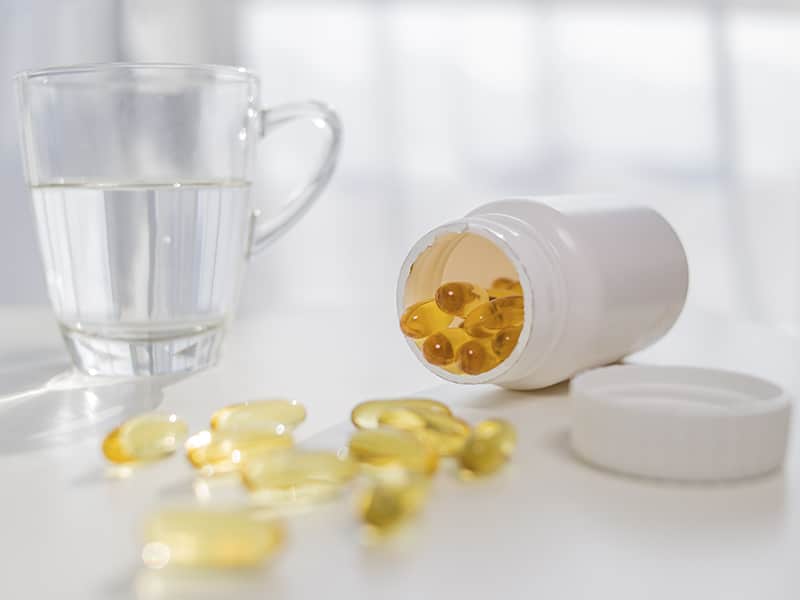Whether you’re looking to meet your recommended daily intake of vitamins and minerals or hoping to address diabetes-related complications, there’s a world of supplements to consider, along with potential drug interactions, conflicting information, and safety issues.
Whether or not a supplement has clinical evidence to suggest that it helps with diabetes or related complications, the bigger question to ask is, will taking this supplement or vitamin be harmful or pose a risk to me?
Daily Dosage
Many think that a supplement contains the same vitamins and minerals as whole foods, so why not just take a pill instead of eating? It’s because vitamins and minerals are better absorbed through food.
Think of it this way: whole foods contain a mix of minerals, enzymes, fiber, and other substances that can help your body absorb and use these nutrients. Eating a well-balanced meal is much healthier than a multivitamin. It’s not clear whether vitamins and minerals have the same effect on the body when taken in supplement form.
However, if you have a true vitamin deficiency, a supplement can be helpful. The most common vitamin deficiencies are in vitamins D and B12, calcium, and iron. The only way to know if you’re deficient is through blood tests, but you may see some signs. If you’re experiencing symptoms that you think a supplement could address, consult your doctor or clinical nutritionist before trying to remedy the issue yourself.
Supplements Affecting Blood Sugar
Supplements can cause unwanted or dangerous side effects, especially if they interact with your medications. While some ingredients might intensify the effects of your diabetes medications, leading to hypoglycemia (low blood sugar), others may have the opposite effect, leading to hyperglycemia (high blood sugar).
Research on many supplements is inconclusive. Talk to your healthcare provider before starting chromium, vitamin E, St. John’s wort, or niacin.
- Chromium
A deficiency in chromium can lead to high blood sugar levels. It may be worth trying if you’re deficient in chromium, but that’s very rare. Stay away if you’ve been diagnosed with kidney disease. Chromium supplements could further damage the kidneys and worsen the disease. - Vitamin E and St. John’s Wort
Both vitamin E and St. John’s Wort can have dangerous interactions with anticoagulant medications used to treat heart diseases, increasing the risk of bleeding. Among people with heart diseases receiving warfarin (an anticoagulant), those with higher levels of vitamin E in their bodies are more likely to experience bleeding events. Other studies have found that St. John’s Wort amplifies the effect of anticoagulants. Avoid these supplements if you’re taking an anticoagulant medication. Besides warfarin, other related medications may include apixaban, dabigatran, heparin, and rivaroxaban. - Niacin
Some people take niacin to increase HDL cholesterol (“good” cholesterol), but it can also affect your diabetes control. Niacin raises fasting glucose levels (your blood sugar levels when you’re not eating) for people with diabetes, which means the risks may outweigh the benefits. And while niacin may increase HDL cholesterol, there’s no evidence that this leads to a reduced risk of cardiovascular disease. A discussion with your healthcare provider can help determine if this is safe for you.
Confused about what to take? Unless your healthcare provider recommends a specific vitamin or supplement, adding another pill to your regimen is probably not as useful or cost-effective.
Other Common Supplements
Here’s what you need to know about other common supplements:
- A vitamin B12 supplement can be helpful if you have type 2 diabetes and are deficient in the vitamin. People taking metformin for type 2 diabetes have lower vitamin B12 levels. If you’re on metformin, talk to your healthcare provider about getting tested periodically for a B12 deficiency.
- Vitamin C and E supplements won’t prevent diabetes or diabetes complications. Until research shows a clear benefit, it’s best to ask your doctor if you should consume them.
- Vitamin D. There’s an association between higher concentrations of vitamin D in the blood during childhood and a lower risk of type 1 diabetes. More research is needed to understand the link, but one thing experts can agree on: if you’re deficient in vitamin D, a supplement may help.
- Cinnamon isn’t as effective as your type 2 diabetes medication. Cinnamon supplements do nothing to help people with type 2 diabetes reach treatment goals or provide a reliable drop in blood sugar. However, since cinnamon is a fragrant spice, you can use it to flavor your food instead of sugary condiments. Enjoy a dash of cinnamon in oatmeal instead of taking supplements.
- Alpha-lipoic acid (ALA) reduces diabetic neuropathy pain. ALA injections, which are only available in Europe, improve neuropathy symptoms in the short term. Results are mixed with oral supplements, which are available in the United States.
The Key Point
At the end of the day, be sure to talk to your diabetes team before making changes: your healthcare provider and your clinical nutritionist or nutrition expert can help you determine if adding a vitamin or supplement to.





